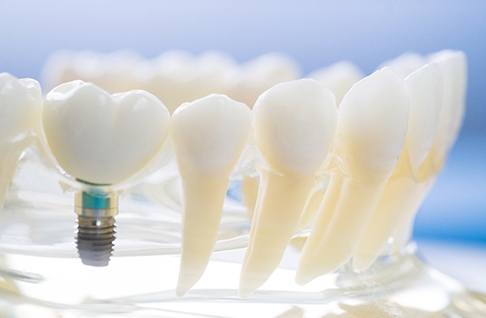DENTAL IMPLANTS – FORT WORTH, TX
New, Lifelike Replacement Teeth
Over the last few decades, dental implants in Fort Worth have emerged as one of the most popular tooth replacement treatments chosen among patients. This is because they offer a wide array of unique benefits that revolve around both health and aesthetics. They restore the entire structure of missing teeth, making them feel and function nearly identically to your home-grown pearly whites. To learn whether you’re a good candidate for dental implants in Fort Worth, TX, don’t hesitate to reach out to our team to schedule a consultation with Dr. Buck today.
Why Choose Hulen Crossing Family Dental for Dental Implants?

Start-to-Finish Dental
Implant Treatment

Experienced Oral Surgeon
On-Staff

Dental Sedation for Surgery
What are Dental Implants?
Dental implants themselves are small, titanium posts that are surgically placed below your gum line and into the jawbone to restore the roots of your missing teeth. Due to their biocompatible nature, they’re able to fuse with the bone, helping them keep the structure from eroding by providing it with necessary stimulation and blood flow. Once this process is complete, we’ll be able to attach a customized crown, bridge, or full or partial denture to replace any number of missing teeth.


The 4-Step Dental Implant Process
Dental implants are considered the gold standard of tooth replacement for a good reason. Even though the process takes several months to complete, patients find the incredible benefits well worth the time and effort. At Hulen Crossing Family Dental, we’re proud to be able to offer this top-tier smile upgrade to you. While every patient’s treatment plan will look slightly different, there are four main steps that you can expect regarding dental implants in Fort Worth.
INITIAL DENTAL IMPLANT CONSULTATION
DENTAL IMPLANT SURGERY
DENTAL IMPLANT OSSEOINTEGRATION & ABUTMENT PLACEMENT
DELIVERY OF DENTAL IMPLANT RESTORATIONS
Benefits of Dental Implants
As the only tooth replacement option that rebuilds the entire structure of a missing tooth, the dental implants Hulen Crossing patients rely on offer a variety of important benefits that you simply can’t get with dental bridges or dentures. You can enjoy results that mimic natural teeth in virtually every way, boosting your health, confidence, and quality of life in the process. Read on as we cover some of the most popular benefits dental implants have to offer!
DAY-TO-DAY BENEFITS
Easy maintenance: Unlike dentures and dental bridges that need special cleaning solutions and brushes, you can care for your dental implants just like they were natural teeth.
Eat all your favorite foods: Dental implants can restore 80% or more of your natural chewing power with optimal stability, so you can easily eat nuts, steak, apples, or anything else on your plate.
Absolutely seamless results: The restorations that are paired with dental implants are designed to look just like natural teeth, so no matter how many teeth you’re replacing,
Smile confidently: Since dental implants are firmly anchored into your jawbone, they will never slip or pop out of place at embarrassing times. You may even forget you have them as you talk, laugh, smile, and go about your day!
HEALTH BENEFITS
Preservation of your youthful appearance: Dental implants prevent jawbone deterioration, which stops the sunken, aged facial appearance that typically comes with tooth loss.
Minimize your risk of future tooth loss: As dental implants strengthen the portion of the jawbone they’re embedded in, they support the surrounding tissues supporting the rest of your teeth, helping keep them securely in place.
Keep your remaining teeth healthy: Dentures and dental bridges wear down remaining teeth and cause gum irritation, but dental implants are completely self-supporting, making them the healthiest option for your smile.
Enjoy better overall health: Dental implants allow you to eat a healthier, more nutritious diet, which can dramatically improve your health. Plus, research indicates that maintaining better oral health has a demonstrable positive effect on overall health, including a lower risk of heart health, memory loss, and respiratory disease.
LONG-TERM BENEFITS
A reliable, long-term success rate: When placed by an expert like one of our doctors, dental implants have an astonishing success rate of 95% over 10 years!
New teeth for life: With the proper care, you can easily expect your dental implants to last a lifetime!
Save thousands of dollars: Dental bridges and dentures have a lower initial price than dental implants, but they need to be replaced every five to seven years. Since dental implants can last a lifetime, they can potentially save you thousands of dollars in replacements alone over the years! Plus, dental implants prevent future tooth loss and lower your risk of oral health issues, which reduces the overall cost of caring for your smile.


Who Dental Implants Can Help
WHO IS A GOOD CANDIDATE FOR DENTAL IMPLANTS?
Practically any healthy adult with missing teeth can be considered a good candidate for dental implants. We typically don’t recommend dental implants for patients younger than 18 years old, since their jawbones are still developing and changing. However, there is no upper age limit for dental implants! You simply need to have these main qualities:
Good health: You need to be well enough to undergo minor oral surgery to have your dental implants placed.
Great oral health: Issues like cavities and gum disease need to be treated first, since these problems can cause dental implant failure.
Adequate jawbone dentistry: Your jawbone needs to be strong enough and dense enough for dental implants to fuse with.
MISSING 1 TOOTH
MISSING MULTIPLE TEETH
For replacing multiple consecutive missing teeth, we can secure an implant bridge to two dental implants that we’ll place on either side of the gap in your smile. Again, this prevents the need to file down healthy teeth.
For replacing multiple missing teeth around the mouth, you have a few options. You could choose to replace each individual tooth with a single dental implant and crown, but it may be easier and more cost-effective to use a few dental implants to secure a partial denture in place.
WORKING WITH LOCAL SPECIALISTS
If you are missing all your natural teeth or are tired of your traditional removable denture, dental implants from the dentist Fort Worth relies on can be an excellent choice for you! For more complex tooth loss situations like these, Drs. Buck and DeSimone partner with local implant specialists to ensure that you receive the expert care you deserve. We want to make sure that your new smile lasts a lifetime!
Understanding the Cost of Dental Implants
PRELIMINARY TREATMENTS & DENTAL IMPLANTS SURGERY
THE PARTS OF YOUR DENTAL IMPLANTS
Number of Implants: Depending on the number of teeth that you are needing to have replaced and where they are in the mouth, we will determine what the right number of implants is for you. The more implants you get, the greater the cost.
Type of Restoration: Crowns, bridges, and dentures all have their own costs. Smaller restorations tend to be more affordable.
Materials Used: Implants can be made out of either titanium or zirconia. These materials are at different price points.
Brand of Dental Implant: Dental implants come from numerous different manufacturers. This can influence their cost.
HOW DENTAL IMPLANTS CAN SAVE YOU MONEY
DOES MY DENTAL INSURANCE COVER DENTAL IMPLANTS?
MAKING DENTAL IMPLANTS AFFORDABLE
If you don’t have dental insurance, this doesn’t mean that you are completely out of luck. We have an in-house dental membership plan that allows patients to save on procedures completed at our practice. We also work with CareCredit – a third-party financing company that can divide the cost of treatment into manageable monthly installments to fit into your budget. Talk to one of our friendly team members to learn more.


Dental Implant Post-Op Instructions
WHAT TO DO DIRECTLY AFTER DENTAL IMPLANT SURGERY
Avoid spitting. Instead, swallow your saliva or use a tissue.
Don’t use straws when you drink.
Keep your tongue and fingers away from the surgical site.
COMMON SIDE-EFFECTS WHEN RECOVERING FROM DENTAL IMPLANT PLACEMENT
Bleeding: Intermittent bleeding is normal right after surgery. This can be lessened with the use of gauze and light pressure. This should subside after just a few days.
Swelling: Swelling is often present for the first 72 hours after surgery, but sometimes it can last over a week. Cold compresses can help to reduce this.
Soreness: It’s normal for the area to feel sore for a few days, but this can be managed by taking recommended pain relievers as directed by your dentist.
YOUR DIET AFTER DENTAL IMPLANT SURGERY
Mashed potatoes
Yogurt
Ice cream
Pudding
Soup
Scrambled eggs
Pasta
POST-OP HEALTH & ORAL HYGIENE
Brush your teeth the day after your surgery. Be especially careful near the surgical site.
Rinse your mouth with saltwater.
Use your prescription mouth rinse if you were provided with one.
Stay away from mouthwashes that contain high levels of alcohol.
WHAT TO DO AFTER YOUR NEW TEETH ARE ATTACHED
Dental Implant FAQs
HOW LONG DO DENTAL IMPLANTS LAST?
DOES GETTING DENTAL IMPLANTS HURT?
AM I TOO YOUNG OR OLD TO GET DENTAL IMPLANTS?
HOW LONG DOES IT TAKE TO RECOVER FROM DENTAL IMPLANT SURGERY?


